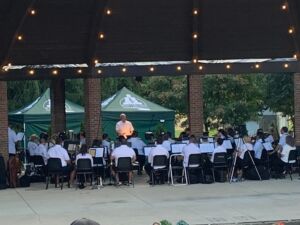
This summer, the Westerville Symphony was invited to collaborate with the City of Westerville Parks and Recreation Civic Theater on a semi-staged production of Rodgers and Hammerstein’s The Sound of Music. This was a strategic opportunity for the Orchestra, and the City was generous in its financial commitment to the project, so we gladly accepted. The performances were set to take place in late July at the Alum Creek Park Amphitheater, a lovely outdoor venue near the campus of Otterbein University. Three performance were planned, and there was no rain location.
The Westerville Symphony has evolved from a community orchestra into a semi professional ensemble that includes students from Otterbein University, townsfolk from the region who play purely as an avocation, as well as ever growing component of freelance professional musicians from the area. At first glance, collaborating with a purely volunteer theater troupe might seem to be a sideways step, but the result was a highly enjoyable and, for the most part, artistically rewarding experience.
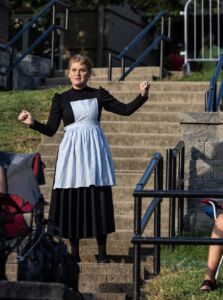
The event was significant in scope as Civic Theater began rehearsals in early June for a production that would take place the final week in July. Directed by Kate Hamilton Munger and Michael Ruehrmund, musical preperation was by Kelsey Burkett. The casting, as one can imagine, ran the gamut of talent. In the lead, as Maria Rainer, was an old and dear friend, Cassie Rea. Cassie is a courageous young actress/singer who, with my encouragement, went to New York to try to “make it on Broadway.” She has the talent, but just never seemed to connect with the right opportunity despite her resolve. I am enormously proud of her determination, and equally dismayed that the Broadway establishment didn’t recognize her talent. But what a joy it was for me to create music with her again! I also encountered several other significant talents, a dancer from the Ft. Wayne Ballet, several strong singers ( the chorus of nuns that had impeccable harmony!), and a wonderful bunch of kids who were a lesson to us all in tenacity, discipline, and collegiality. Even little Gretl took a header onto the brick pavement at one point, but she picked herself up, shook it off, and went on with the show! What a trooper! Another longtime acquaintance, Sydney Smith, the only Actors Equity Stage Manager in the region, was on deck keeping us all organized. It is always a joy to work with Sydney, and lift, lug, load, transport, and commiserate together, we did!
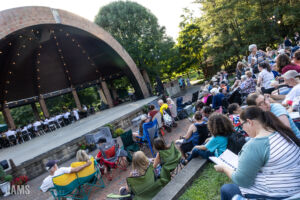
The production was not without issue. Early on it was apparent that Covid would be a persistent problem. Cast members would drop out of the four-night-per-week rehearsal schedule to self-treat and quarantine. Luckily no case was too severe, until opening night when Cassie, our Maria, came down with it. The City stepped in, realizing that the entire production was a petri dish, and cancelled the weekend’s remaining performances. Nine positive cases were reported the next day, including one in the orchestra. The cancellation was enormously disappointing, particularly to the cast who had worked so hard. Even the musicians, typically surly with the drudgery of pit work, were saddened. We were, miraculously, able to reschedule the remaining two performances with only a handful of substitutions in cast and orchestra. Then, Mother Nature, this time in the form of a deluge, forced yet another cancellation of what would have been the final show.
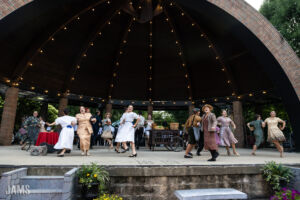
The camaraderie of the cast was heartwarming. They were like family with each other. Bonding over weeks of rehearsal is one luxury that exists in the theater world, but rarely translates to the orchestra realm. A few of the cast members went out of their way to thank and congratulate the Orchestra. Franz, the von Trapp butler (a.k.a Dayton Duval), even brought fireball whisky shots for us one night. Pit work can be less than artistically fulfilling to many musicians simply becuase of a lack of understanding. Because of their training, orchestral musicians are able to come in at the end of the rehearsal process and create a stunning rendition of the score. This ability, however, creates a certain degree of separation from the Company that makes musicians feel awkwardly margianilized from the actors/singers/dancers. Having the Westerville Symphony onstage with their artistic partners went a long way to diminish this gap,and the Company was very gracious in its support.
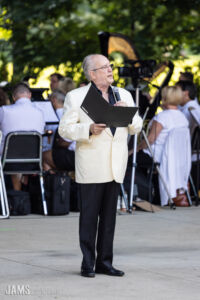
The Sound of Music would be the last show upon which Rodgers and Hammerstein were able to collaborate. Oscar Hammerstein II would pass away only nine months after the opening night of Sound of Music. Hammerstein was perhaps the most political lyricist in the history of Broadway. I mean, think about it! He wrote Showboat, a piece that exposed the horrors of racism back in 1927. Sound of Music deals with the rise of the Third Reich at the time of the Anschluss – the annexation of Austria on March 13,1938. But the producers were so wary of the subject, even in the late 50’s that they wouldn’t allow Hammerstein to mention the name of the German dictator. The subject matter was dangerous enough. Richard Rodgers, with the Sound of Music, was allowed to return to his classical roots. He was classically trained, so setting a piece in Austria allowed him to reflect on that rich heritage of composers who hailed from there, like Mozart, Beethoven, Brahms, Schubert, and so forth. He was able to write church music, waltzes, even a Landler, a dance form that Gustav Mahler so often assuaged for his musical expression.
I think that there are some prophetic moments in the timing of all of this. The first song Rodgers and Hammerstein wrote together was Oh What a Beautiful Morning, and their final collaboration was Edelweiss. The last word that they contemplated together was “Dream.” The Sound of Music is about hope, and I think that is just as relevant in 2022, perhaps even more so than when the piece was unveiled in 1959.
This was, for the most part, a very enjoyable experience. Iconic choral conductor Robert Shaw once said that music loses a certain degree of its innocent sincerity when entrusted solely to the professionals. I think that is very true. This experience was a solid lesson in that premise. Mr. Shaw also saw to it that he never took additional compensation for his work with the volunteer Atlanta Symphony Chorus. I shared that commitment to The Sound of Music. Making the orchestra a synergetic, collaborative, and pliable asset to the Community is a way to sustain itself into the future. I am sure that we accomplished this with The Sound of Music! “A bell is no bell ‘till you ring it. A song is no song ‘till you sing it.”

